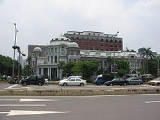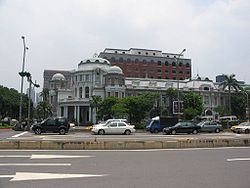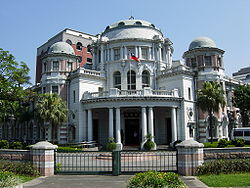
Control Yuan
Encyclopedia


Republic of China
The Republic of China , commonly known as Taiwan , is a unitary sovereign state located in East Asia. Originally based in mainland China, the Republic of China currently governs the island of Taiwan , which forms over 99% of its current territory, as well as Penghu, Kinmen, Matsu and other minor...
government in Taipei
Taipei
Taipei City is the capital of the Republic of China and the central city of the largest metropolitan area of Taiwan. Situated at the northern tip of the island, Taipei is located on the Tamsui River, and is about 25 km southwest of Keelung, its port on the Pacific Ocean...
, is an investigatory agency that monitors the other branches of government. It may be compared to the Court of Auditors of the European Union, the Government Accountability Office
Government Accountability Office
The Government Accountability Office is the audit, evaluation, and investigative arm of the United States Congress. It is located in the legislative branch of the United States government.-History:...
of the United States, a political ombudsman
Ombudsman
An ombudsman is a person who acts as a trusted intermediary between an organization and some internal or external constituency while representing not only but mostly the broad scope of constituent interests...
, or a standing commission
Government agency
A government or state agency is a permanent or semi-permanent organization in the machinery of government that is responsible for the oversight and administration of specific functions, such as an intelligence agency. There is a notable variety of agency types...
for administrative inquiry.
Since 2008, Wang Chen-Shien has served as President of the Control Yuan.
Powers and responsibilities
- impeachment
- censure
- supervision
- audit
- investigation of officials
Structure
The structure of the Control Yuan consists of the President, Vice President, a 27-member council and the Ministry of Audit (also known as the National Audit Office).Council
The council of the Yuan, chaired by the Yuan President, is divided into seven committees covering the following:- domestic and ethnic minority affairs
- foreign and overseas Chinese affairs
- national defense and intelligence affairs
- finance and economic affairs
- education and cultural affairs
- transportation, communications and procurement affairs
- judicial affairs and prison administration
No member of the Control Yuan can hold another public office or profession while serving in the branch (according to Article 103 of the constitution), and members must be able to perform absent of partisan control or influence. Members can vote in no more than three committees and can join additional committees as non-voting members. Each committee can have up to 14 members and usually elects a convenor amongst themselves to chair committee meetings.
Ministry of Audit
The Ministry of Audit, headed by an auditor-general who is nominated by the President of the Republic and appointed with consent of Parliament, exercises the Control Yuan's power of audit through a number of agencies.Pre-republican China
The idea for the Control Yuan was inspired by a long tradition of supervision used in past dynasties, ranging from the Censor (御史; yü shih) established by the Chin and Han dynasties to the tai (台) and chien (諫) offices established under the Sui and Tong dynasties (tai were selected to supervise civil officials and military officers, while chien were selected to counsel the emperor on supervisory matters) to the Board of Public Censors (都察院; tucha-yüan) selected under the Ming and Ching dynasties. Most of these offices also operated local and provincial branches to supervise local governments.Under the Ching dynasty, the Board of Public Censors consisted of forty or fifty members, and two presidents, one of Manchu ancestry and the other of Chinese ancestry. They were, in theory, allowed to send one censor to participate in the meetings of all government boards. The Board's powers were minimized by the time of political flux which preceded the end of the Empire.
Republican China
As a republican phenomenon, the idea of government supervision and audit was adopted by Sun Yat-sen during his involvement with the TongmenghuiTongmenghui
The Tongmenghui, also known as the Chinese United League, United League, Chinese Revolutionary Alliance, Chinese Alliance and United Allegiance Society, was a secret society and underground resistance movement formed when merging many Chinese revolutionary groups together by Sun Yat-sen, Song...
as part of five proposed branches of republican government. Following the establishment of the provisional republican government, the traditional three branches were initially put in place. By 1928, however, the Control and Examination Yuans were established by the provisional government. A sixth Auditing Yuan (審計院; pinyin: Shěnjì Yùan) was established in February 1928, but in February 1931, the Auditing Yuan was downgraded to the current Ministry of Audit and incorporated into the Control Yuan.
The first formal Control Yuan was elected by provincial, municipal, Mongolian, Tibetan, and Overseas Chinese representative councils and was first convened in 1948 following the enactment of the 1947 Constitution. Most branch offices of the Control Yuan were closed following the KMT evacuation to Taiwan from the mainland.
In Taiwan
In 1992, the selection process for the Control Yuan was reformed by constitutional amendment, with representative council elections being replaced by National Assembly confirmations. This was further reformed in 2000 by the replacement of the National Assembly with the Legislative Yuan for confirmation elections.At the end of 2004 President Chen Shui-bian sent a list of nominees to positions in the Control Yuan to the Legislative Yuan
Legislative Yuan
The Legislative Yuan is the unicameral legislature of the Republic of China .The Legislative Yuan is one of the five branches of government stipulated by the Constitution of the Republic of China, which follows Sun Yat-sen's Three Principles of the People...
for approval. The Pan-Blue Coalition
Pan-Blue Coalition
The Pan-Blue Coalition 泛藍聯盟 or Pan-Blue Force is a political alliance in the Republic of China , consisting of the Kuomintang , the People First Party , and the New Party . The name comes from the party colours of the Kuomintang...
, which then held a majority in the Legislative Yuan, refused to ratify President Chen's nominees and demanded that he submit a new list. The political deadlock that resulted stopped the Control Yuan from functioning from February 2005 to July 2008. Following the election of President Ma of the Pan-Blue Coalition
Pan-Blue Coalition
The Pan-Blue Coalition 泛藍聯盟 or Pan-Blue Force is a political alliance in the Republic of China , consisting of the Kuomintang , the People First Party , and the New Party . The name comes from the party colours of the Kuomintang...
, the Legislative Yuan ratified a new list of members of the Control Yuan and Wang Chien-shien
Wang Chien-shien
Wang Chien-shien is a founder of the New Party. He was finance minister of the Republic of China from 1990 to 1992 and is the chairman of the Chinese Management Association...
was appointed to be its President.
Presidents of the Control Yuan
- Cai YuanpeiCai YuanpeiCai Yuanpei was a Chinese educator and the president of Peking University. He was known for his critical evaluation of the Chinese culture that led to the influential May Fourth Movement...
(1928—1929) - Zhao Daiwen (1929—1930)
- Yu Yu-jen (1930—1964)
- Li Shih-tsung (1964—1972)
- Chang Wei-han (1972—1973)
- Yu Chun-hsien (1973—1988)
- Huang Tzuen-chiou (1987—1993)
- Chen Li-anChen Li-anChen Li-an , sometimes spelled Chen Lu-an, is an electrical engineer, mathematician and former Taiwanese politician.-Biography:Son of former Vice President Chen Tsyr-shiou and earned his masters' and Ph.D. in mathematics from New York University. He had a close friendship with Wang Yung-ching, a...
(1993—1995) - Cheng Sui-Je (1995—1996)
- Tso-Yung Wang (1996—1999)
- Fredrick ChienFredrick ChienFrederick Chien Foo , also spelled Fredrick Chien, was the Minister of Foreign Affairs of the Republic of China on Taiwan from 1990 to 1996.-Background:...
(1999—2004) - Post vacant (2004—2008)
- Wang Chien-shienWang Chien-shienWang Chien-shien is a founder of the New Party. He was finance minister of the Republic of China from 1990 to 1992 and is the chairman of the Chinese Management Association...
(2008—present)

